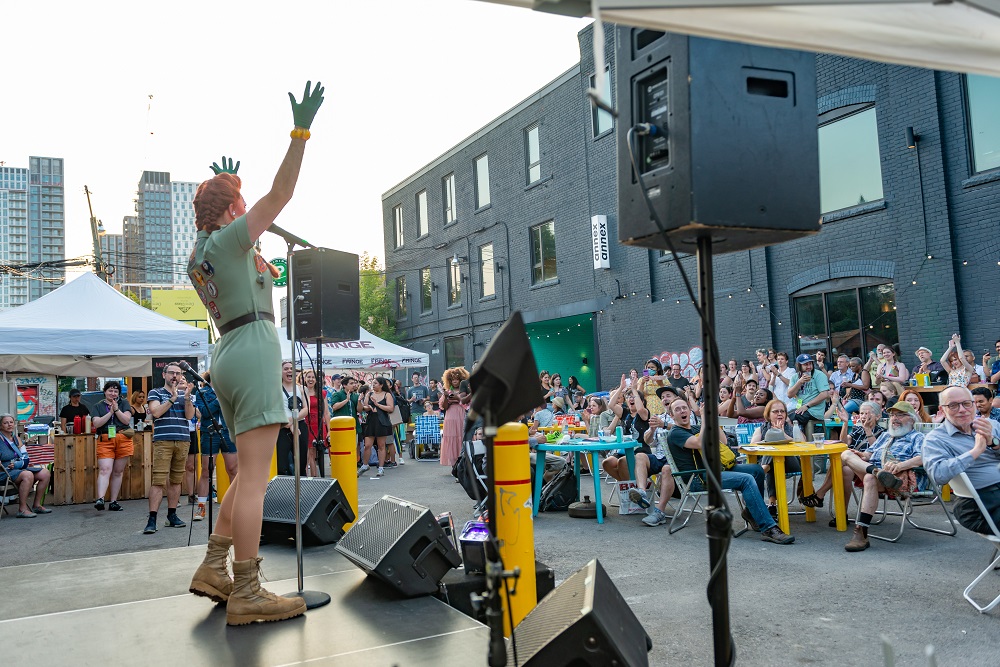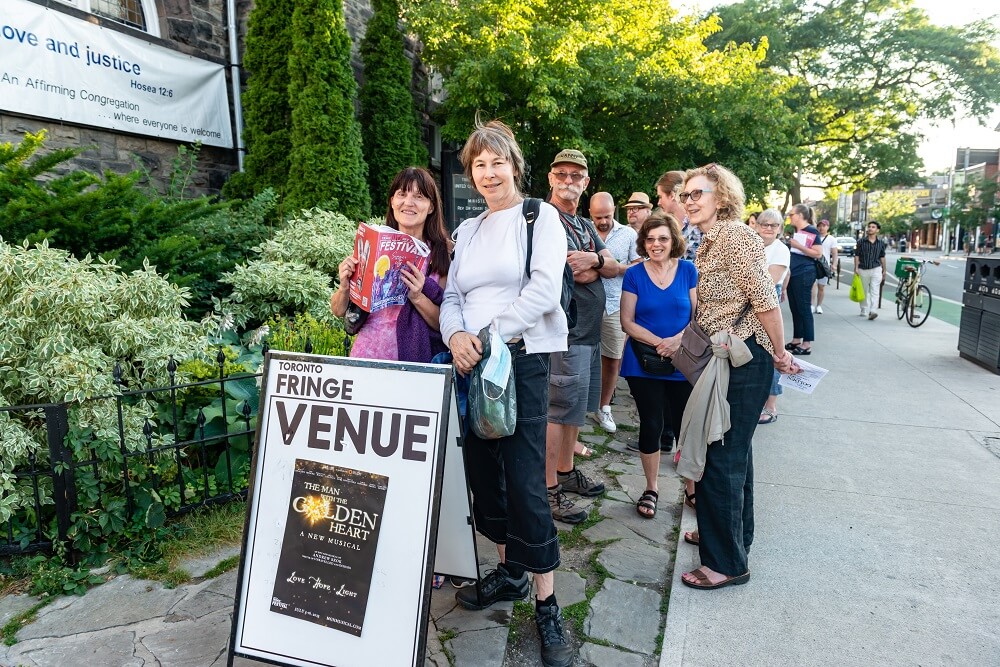In this fun interview with Rachel Kennedy, the Executive Director and Co-Lead of the Toronto Fringe Festival, we delve into the vibrant world of this grassroots, charitable organization. The Toronto Fringe Festival, a cornerstone of the city’s arts community, hosts the annual Toronto Fringe Festival each July and the Next Stage Theatre Festival in October, alongside various year-round programs supporting youth, artists, and the broader theatre community.

Describe your charity/non-profit/volunteer work in a few sentences.
Toronto Fringe is a grassroots, charitable organization that runs the Toronto Fringe Festival each July, the Next Stage Theatre Festival now in October, and various year-round programs that benefit youth, artists, and the theatre community at large. Embedded in Fringe’s operations are the values of Access, Accountability, Creativity, Exploration, and Support. Toronto Fringe is a creative match-maker, connecting artists with audiences, and empowering everyone to unleash their artist within. Toronto Fringe creates vital opportunities for both emerging and established artists to produce their work with complete artistic freedom while making productions as affordable and accessible as possible.
What problem does it aim to solve?
The Toronto Fringe is a platform for everyone to access, discover, and experiment with the arts. This is especially important in today’s social and economic climate because we are offering heavily subsidized opportunities for new artistic voices while keeping ticket prices low (all under $20!) for audience members. In addition, we are helping create entrepreneurial training and paid work experience for these artists – and they take home 100% of the box office profits! By valuing creative experiences for artists and audiences alike, we contribute to a healthy arts economy and, ultimately, a thriving society.
In addition to our main festival programming, we also run our KidsFest Club offering free family entertainment daily at St. Volodymyr Institute, teen workshops, a kids day camp, our Theatre Entrepreneurs’ Network & Training (TENT) program, our New Young Reviewers training program, a speakeasy with weekend programming, and the Fringe Patio at the Tranzac with free community arts activations running daily. We strive to welcome as many different community members to experience the benefits of the arts every summer. There’s something for everyone at the Fringe!
When did you start/join it?
I joined as Executive Director and Co-Lead just this past January, so this will be my very first annual cycle of both festivals! I’m looking forward to kicking off our Toronto Fringe Festival this July 3-14th, with our launch party on July 2nd at the Fringe Patio. During these exciting 12 days, we will have 77 shows inhabiting 16 venues across the City of Toronto. To say I am excited is an understatement. I am positively buzzing and deeply humbled to be a part of this team alongside our Co-Lead and Managing Director, Laura Paduch.
What made you want to get involved?
Toronto Fringe has touched the careers of almost every theatre and performing arts professional here in Toronto. Ask any of them! It’s astounding to hear all of the industry stories of folks who #StartedAtTheFringe. I did my very first professional production over a decade ago at the Toronto Fringe Festival, and I have stayed involved as a mentor, community member, producer, and avid audience member ever since. Fringe has an essential and unique place in the career trajectories and hearts of arts professionals in Toronto and beyond. But even those who are not creators have probably been touched by the Fringe – for example, you might have enjoyed smash hit Canadian TV shows like Kim’s Convenience, or ‘da Kink in my Hair… did you know they started as shows at the Fringe? Even the creators of the smash musical Come From Away did their very first musical here on our stages.
The impact of the Toronto Fringe is palpable in every corner of the creative sector and on audiences from near and far. I couldn’t be more proud to be involved with this work, and I invite you to come get involved too!
What was the situation like when you started?
Fringe Festivals exist across North America and the globe because the performing arts have historically been notoriously hard to break into, especially for those of us seeking to build stable careers and create community impact through the arts. Without the Toronto Fringe Festival and the opportunities it offers, artists looking to put on their first show or try out a new idea would carry the burden of paying for a multi-week venue rental, technicians, box office, front-of-house and marketing materials on top of their artist fees for rehearsals and performances. This very quickly runs up thousands of dollars in costs before tickets can even go on sale – which is of course not a stable model for artists to take risks and build their entrepreneurial prowess. This is also why we see the cost of attending live arts increasing in recent years – it is simply too expensive to put on independent theatre shows without burdening the audience with offsetting some of those overhead costs. Unfortunately, this means that many families and individuals have historically been priced out of being able to experience the magic of live performances.
This is where Fringe has come in as a solution. We have the unique ability to create pathways for collaborating and subsidizing these costs for our artists, allowing ticket prices to remain as some of the most affordable audience opportunities in the city!
How has it changed since?
By offering greatly subsidized theatre rentals, box office, front of house and marketing for all of our shows, we are taking the financial and administrative burden off of artists who are looking to debut new work on stage. We have a mandate to provide accessible theatre experiences, by every definition of the word. This means that on top of making the experience of creating or attending a show financially affordable, we also ensure that all of our shows are happening in physically accessible performance spaces. We want to make sure that we help close the gap on those who are left out of these essential cultural experiences, and open our doors to as many different voices and identities as possible.
Truly so many artists in Canada have been welcomed to the professional performance world by way of Fringe Festivals from coast to coast. Toronto Fringe is proud to be a part of that history and a part of helping to create change by training up-and-coming arts professionals with best practices and healthy processes for creating within the industry. In recent years we have added programs to increase physical access and overall well-being through our partnership with the Disability Collective, we have hired Active Listeners and provided de-escalation training so that we can have our staff and volunteers ready to help with community members who may need assistance or support, and we have created KidsFest and our Kids Day Camp so that families in our artistic community and beyond can access affordable childcare and children’s cultural activities during the Toronto Fringe Festival.
What more needs to be done?
I believe that further collaboration is needed, to ensure that Toronto Fringe can continue to afford to subsidize and create these opportunities within Toronto. As our organizational and operational costs continue to rise, so do the needs of our artists who count on ticket sales in order to earn a fair wage during the run of their shows, and we don’t want to fall into the trap of having to increase our ticket costs beyond an affordable price, in order to help offset these needs. As it stands, less than 10% of our costs are covered by all 3 levels of government funding combined, so we rely heavily on additional grant writing, fundraising, and sponsorships in order to continue offering this vital programming. But with the recent financial challenges facing companies and individuals across the country, we are seeing that relying on individual and corporate support is also not sustainable.
Toronto Fringe is currently looking at different models which we think might benefit our audiences and artists as well as our operational stability, and we look forward to piloting a few of those ideas in the coming years.

How can our readers help?
This year we are highlighting three ways that community members can help us out:
– Support the artists by buying a ticket (this revenue will go directly to the artists in the show!)
– Support the Fringe with a one-time donation (every dollar helps!)
– Support the future with a monthly donation to the Toronto Fringe (reoccurring donations help us plan for the future and will help us plan for our 2025 programming)
Do you have any events coming up?
Toronto Fringe Festival is hosting our Launch Party this July 2nd at the Fringe Patio at the Tranzac (292 Brunswick Ave), and the festival runs from July 3rd to 14th at venues across the city!
Then we will be back in October with our smaller, curated Next Stage Theatre Festival at Buddies in Bad Times Theatre from October 16-27, 2024.
Where can we follow you?
PAY IT FORWARD: What is an awesome local charity that you love?
Toronto Neighbourhood Centres is doing incredible work in supporting communities in Toronto. Rob and Sree are endless wells of knowledge and generosity, and we are lucky to have them here in the City.




